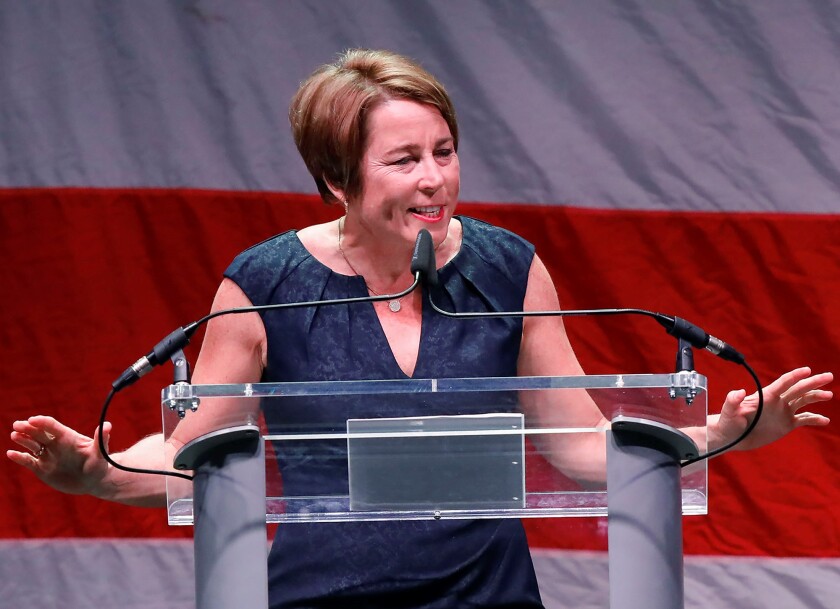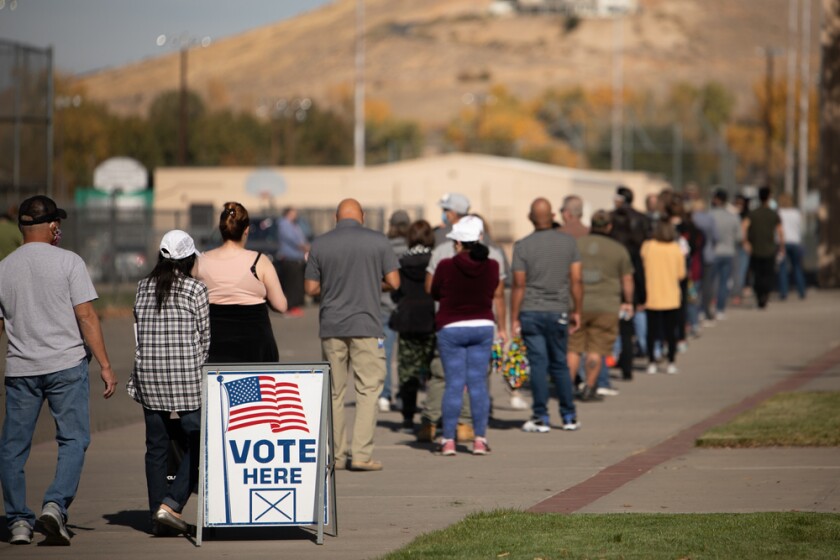Whatever its virtues in terms of public health, Sisolak’s move may be the single biggest reason he’s in serious danger of losing his job on Tuesday. “COVID has essentially gone away as an issue (nationally), but in Nevada it was a significant thing,” says Kyle Kondik, who analyzes governors’ races at the University of Virginia Center for Politics. “Vegas is so dependent on tourism and all that stuff was impacted.”
Sisolak’s race is not the only one in the West where Democrats have to worry. When the year began, it looked like the party’s incumbents in the Midwest would be the nation’s most vulnerable. They’re still at some risk, but Gretchen Whitmer in Michigan and Laura Kelly in Kansas both enjoy polling leads of roughly 5 percentage points over their GOP rivals in the closing days of the campaign. In Wisconsin, Tony Evers is in a tossup race against businessman Tim Michels.

(Wu Xiaoling/Xinhua/Zuma Press/TNS)
It’s not all bad news for Democrats in the West. Having brushed back a recall attempt last year, California Gov. Gavin Newsom is sailing toward an easy victory over state Sen. Brian Dahle. Polls in the competitive races in the region have barely budged for weeks, says David Turner, communications director of the Democratic Governors Association, and remain within the margin of error.
President Biden and former President Barack Obama both made campaign trips to the region last week. “The Republicans have tried multiple messages that haven’t stuck,” Turner says. “We’re banking votes and have the most robust ground game in a midterm ever.”
But the final polls aren’t looking great for Democrats. In Nevada, their usual strength in early and mail voting — their vaunted “firewall” of votes from Clark County, which includes Las Vegas — hasn’t materialized. “Twelve days of early voting in the books, and I think it’s safe to say now after years of watching these numbers/trends: The Dems are in trouble in Nevada,” Jon Ralston, founder and CEO of the Nevada Independent, wrote last Thursday.
The Shifting Southwest
The Southwest has been perhaps the nation’s most competitive region in recent years. In 2020, Biden did well there, becoming only the second Democrat to carry Arizona since Harry Truman (if only by a whisker). For the first time since 1941, Democrats now have control of all eight Senate seats in Arizona, Colorado, Nevada and New Mexico.
Colorado was considered a swing state not that long ago, but Democratic Gov. Jared Polis looks set for an easy victory on Tuesday. Democrats have reason to worry, however, at the gubernatorial level in the other states.
Ducey’s retirement opened up an opportunity for Democrats. Ducey backed developer Karrin Taylor Robson in the GOP primary, calling her rival Kari Lake a “fake” who was “misleading voters” with her complaints that the 2020 election was stolen from Donald Trump.
But Lake won the nomination and has not only gotten Ducey’s backing but united Republicans behind her. Lake, a former Phoenix TV news anchor, entered the race as a well-known personality in the state and has used her broadcasting skills to great advantage, both in terms of her ease on camera and her ability to rouse crowds at rallies that have featured a parade of visiting GOP dignitaries including Trump, Florida Gov. Ron DeSantis and Virginia Gov. Glenn Youngkin.
Democratic Secretary of State Katie Hobbs, by contrast, has run a quiet and cautious — some might argue lackluster — campaign. She’s been widely criticized by Democrats for refusing to appear on a debate stage with Lake. Hobbs has said repeatedly that she didn’t want to give a platform for Lake’s conspiracy theories or be a party to her “spectacle.”
Her decision not to debate, however, has been seen as emblematic of her lack of aggression as a campaigner. “Hobbs’ refusal to debate her opponent on Wednesday represents a new level of political malpractice,” Arizona Republic columnist Laurie Roberts wrote last month. “The entire debacle is ... well, a debacle.”
D Trouble in N States
Another broadcaster is causing headaches for Democrats in New Mexico. Mark Ronchetti, a former weatherman, built up his name recognition with an unsuccessful run as the GOP’s nominee for U.S. Senate two years ago. Like Republicans across the country, Ronchetti has hammered away at the crime issue. On the recent National Assessment of Educational Progress, which showed student achievement declining across the country, New Mexico finished dead last in reading proficiency for 4th and 8th graders.
Democratic Gov. Michelle Lujan Grisham has made abortion rights the cornerstone of her campaign. Last year, she signed a bill repealing the state’s pre-Roe ban. Ronchetti says he favors a 15-week abortion ban, but not an outright ban, but in July a pastor said Ronchetti had told him “his goal would be to end abortion in New Mexico.”

(DNCC/Getty Images/TNS)
Closing polls have shown Lujan Grisham ahead but by margins that range from 2 to 8 percentage points. She’s a former state health secretary and her response to COVID-19 dominated much of her first term. A poll released last month found New Mexico voters evenly divided, 48-48, in terms of approval and disapproval of her handling of the pandemic.
In Nevada, Sisolak’s response to COVID-19 remains a central issue. Las Vegas tourism has nearly recovered to its pre-pandemic levels, but the number of visitors was down nearly 40 percent in the fall of 2021. “Nevada’s recovery from the COVID recession has been uneven due to the spike in inflation that is hitting working-class families particularly hard; the rise in housing prices that has put homeownership out of reach for many; and lingering ill will among small-business owners stemming from the shutdown,” says David Damore, who chairs the political science department at the University of Nevada, Las Vegas.
GOP nominee Joe Lombardo, like Ronchetti, has not embraced Trump’s lies about the 2020 election. As the sheriff of Clark County, Damore notes, Lombardo has been able to run largely on law-and-order themes, as well as being a proven vote-getter in the jurisdiction that makes up the bulk of the Democratic base.

Rare GOP Chance in Oregon
In Arizona, Nevada and New Mexico, Democrats have to worry about growing GOP strength among Latino voters. Although a majority of Latinos — perhaps a supermajority — will still vote for Democrats, the party’s margins probably won’t be as great as they have been in recent elections. And generating turnout among Latinos will also be a challenge. “It’s evident that Republicans are poised … to win their biggest share of Hispanics in the modern era,” The Atlantic predicts.
Democrats are also nervous in the predominantly Anglo state of Oregon. Not only is the governorship at risk, but so are several congressional seats and potentially legislative control as well. Republican state Rep. Christine Drazan, the GOP nominee for governor, is running on a simple theme — it’s time for a change after years of single-party control.
She has hammered away at the issues of crime and homelessness, blaming Democrats for the problems. She hopes to convince voters in time to repeal a drug decriminalization measure. "I ask Oregonians: Are you better off today than you were four years ago?” Drazan said last month. “If the answer is no, then the answer is change."

Outgoing Democratic Gov. Kate Brown has one of the highest net disapproval ratings of any governor in the country, if not the highest. Tina Kotek, the long-serving speaker of the Oregon House, has sought in recent weeks to distance herself from Brown. “Gov. Kate Brown did nothing” on homelessness, Kotek claimed in an ad last month. “On Day One, I will do what Kate Brown wouldn’t. I will get people the help they need to move off the streets.”
Democrats claim that Kotek’s troubles largely stem from the presence in the race of Betsy Johnson, who served in the state Senate as a Democrat but is running as an independent. Both Johnson and Drazan have received seven-figure funding from Phil Knight, the cofounder of Nike. During the summer, polls showed Johnson taking more than a quarter of the vote.
As is typical for independents, Johnson’s support has faded in the home stretch, dropping into the single digits. Democrats are hoping her backers will come home to Kotek. Johnson is not only a former longtime Democrat but a supporter of abortion rights, which Drazan is not. (Drazan says despite her personal beliefs, she will respect Oregon law keeping the procedure legal.)
But there hasn’t been much sign that Johnson backers are flooding back to Kotek. Drazan maintains a small polling edge.
“Not since the 1990 governor’s race has there been a significant third candidate in the mix,” says Keisling, the former secretary of state. “The likelihood that the next governor of Oregon will have significantly less than 50 percent of the vote is very high.”
It’s possible that in the end, Gavin Newsom and other Californians will be surrounded by states with Republican governors — Oregon, Arizona and Nevada.
Related Articles












